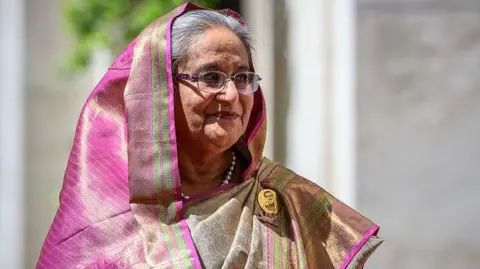
History Will Be Kinder to Sheikh Hasina: A Reflection on Her Legacy
Introduction
Sheikh Hasina, the current Prime Minister of Bangladesh, has been a central figure in the country’s political landscape for several decades. As the daughter of Sheikh Mujibur Rahman, the founding father of Bangladesh, her political journey has been marked by challenges, controversies, and significant achievements. While her tenure has faced criticism from various quarters, there is a growing recognition that history will likely judge her more favorably. This essay explores Sheikh Hasina’s legacy, her contributions to Bangladesh’s development, and the reasons why history may be kinder to her than contemporary assessments suggest.
A Political Journey Defined by Resilience
Sheikh Hasina’s political career began under the shadow of immense personal tragedy. In 1975, her father, Sheikh Mujibur Rahman, was assassinated along with most of her family in a military coup. Hasina, who was abroad at the time, returned to Bangladesh to take up her father’s mantle and lead the Awami League, the party he founded. Her early political journey was marked by resilience and determination as she navigated a turbulent political environment dominated by military rule and political instability.
Table of Contents
Over the years, Sheikh Hasina has faced numerous challenges, including imprisonment, assassination attempts, and intense political opposition. Despite these obstacles, she has remained steadfast in her commitment to her father’s vision of a secular, democratic Bangladesh. Her resilience has been a defining feature of her leadership, allowing her to emerge as one of the most influential figures in the country’s history.
Economic Transformation and Development
One of the most significant aspects of Sheikh Hasina’s legacy is the economic transformation of Bangladesh under her leadership. When she first took office in 1996, Bangladesh was one of the world’s poorest countries, struggling with widespread poverty, underdevelopment, and political instability. Over the course of her multiple terms in office, Hasina has overseen an economic resurgence that has lifted millions out of poverty and placed Bangladesh on the path to becoming a middle-income country.
Under Sheikh Hasina’s leadership, Bangladesh has achieved impressive economic growth, driven by a burgeoning textile industry, increased foreign investment, and a focus on infrastructure development. Her government has implemented policies that have fostered macroeconomic stability, improved healthcare, and expanded access to education, particularly for women and girls. These achievements have contributed to significant improvements in key human development indicators, including life expectancy, literacy rates, and infant mortality.
Moreover, Hasina’s government has prioritized digitalization and technology-driven growth, leading to the emergence of a vibrant tech sector in Bangladesh. Her Digital Bangladesh initiative has been instrumental in expanding internet access and fostering innovation, positioning the country as a hub for information technology and digital services in South Asia.
Social Progress and Women’s Empowerment
Another important aspect of Sheikh Hasina’s legacy is her focus on social progress, particularly in the area of women’s empowerment. Bangladesh has made remarkable strides in gender equality under her leadership, with women playing increasingly prominent roles in politics, business, and society. Hasina’s government has introduced policies that promote women’s education, protect their rights, and provide opportunities for economic participation.
Her administration has also been instrumental in advancing women’s health, with initiatives aimed at reducing maternal and child mortality and expanding access to reproductive healthcare. These efforts have been recognized internationally, with Bangladesh often cited as a model for other developing countries seeking to improve gender equality and women’s empowerment.
Sheikh Hasina’s leadership in these areas has had a transformative impact on Bangladeshi society, helping to create a more inclusive and equitable environment for women and girls. Her commitment to social progress is likely to be one of the key factors that contribute to a favorable historical assessment of her tenure.
Navigating Political Challenges
While Sheikh Hasina’s tenure has been marked by significant achievements, it has not been without controversy. Her government has faced criticism for its handling of political opposition, allegations of human rights abuses, and concerns about democratic backsliding. The concentration of power within the executive branch, restrictions on media freedom, and the treatment of political opponents have all been points of contention.
However, it is important to consider these criticisms within the broader context of Bangladesh’s political environment. The country has a history of political instability, military coups, and authoritarian rule. In this challenging environment, Hasina’s government has managed to maintain relative stability, prevent the re-emergence of military rule, and oversee peaceful transitions of power through elections. Her approach to governance, while controversial, has been shaped by the need to navigate a complex and often volatile political landscape.
In the long view of history, the stability and continuity that Sheikh Hasina has provided may be seen as crucial for Bangladesh’s development. Her ability to maintain control and implement her vision for the country, despite the challenges, may be recognized as a necessary compromise to ensure progress and avoid the chaos of the past.
Conclusion
Sheikh Hasina’s legacy is one of resilience, economic transformation, social progress, and political pragmatism. While her tenure has been marked by controversy and criticism, there is a strong case to be made that history will judge her more kindly. Her contributions to Bangladesh’s development, particularly in the areas of economic growth, women’s empowerment, and social progress, are undeniable.
As Bangladesh continues to evolve and her achievements are viewed in the context of the country’s broader historical trajectory, it is likely that Sheikh Hasina will be remembered as a pivotal figure in the nation’s history. Her leadership has helped to shape a more prosperous, stable, and equitable Bangladesh, and her legacy will continue to influence the country’s future long after she leaves office. In this light, history will indeed be kinder to Sheikh Hasina, recognizing the profound impact she has had on her country and its people.







